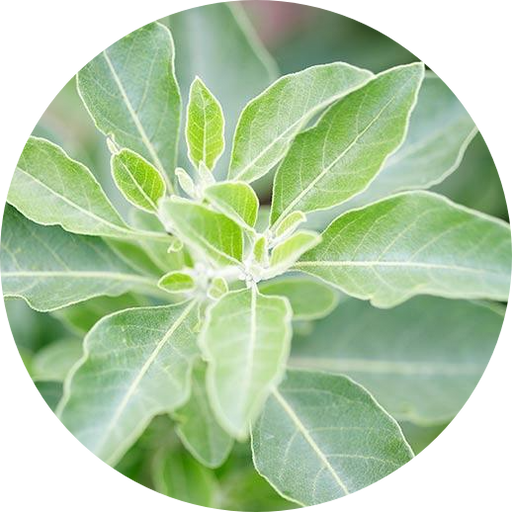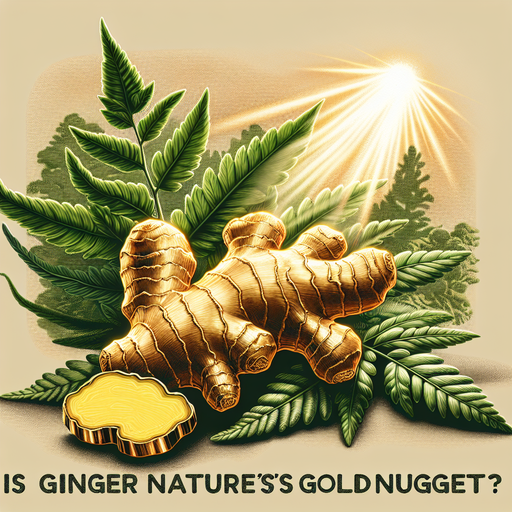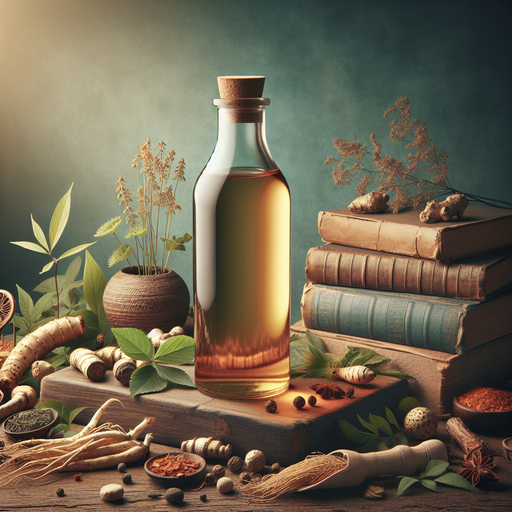Ashwagandha is a popular herb used throughout Australia and the world that stems from being a traditional medicine used in Ancient India. It has long been known as the most popular Ayurvedic herb with good reason. Ashwagandha has been used for thousands of years to improve mental clarity, reduce stress, anxiety and feeling overwhelmed as well as other amazing benefits.
Ashwagandha is an adaptogenic herb found in India, Africa and some parts of the Middle East. It is commonly known as "Indian Winter Cherry" or "Indian Ginseng". This evergreen grey shrub has yellow flowers and small red berries which contain yellow seeds. The roots of this plant contain its medicinal properties, and upon harvesting the roots are dried and processed. As the name suggests (Ashwa means horse in Sanskrit, and Gandha means smell), the consumption of this herb is believed to increase vitality and make the body as strong as a horse.
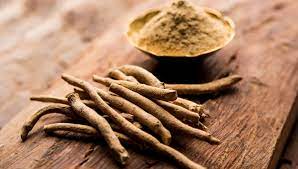
Traditional Use
Ashwagandha is an important herb in Ayuverdic medicine, which is considered one of the world's oldest medical systems. In Ayurvedic medicine, ashwagandha is considered a Rasayana. This means that it helps maintain youth, both mentally and physically. This healing Indian tradition uses the combination of nutrition, exercise, mindfulness practices and herbs to promote the holistic management of an individual's health.
What Adaptogens Are
Adaptogens are non-toxic herbs that increase mental sharpness, reduce stress and fatigue and stimulate brain activity. Herbs are considered adaptogens if they meet three criteria:
- They are non-toxic
- They reduce stress and anxiety
- They promote overall health benefits
Adaptogens were first studied in Russia and were used as stimulants to increase the stamina of the Russian military in WW2. The Russian scientist N.V Lasarez discovered that Ashwagandha, Ginseng and Rhodiola Rosea were the most potent adaptogens. These are the 3 active ingredients in our Stress Less product. Check it out!
Adaptogens work by increasing the body’s resistance to physical and psychological stressors, allowing the body to normalise these effects and manage them more effectively. They regulate cortisol levels by working with the central stress regulatory axis, which are the hypothalamus and pituitary and adrenal glands, regulating the key stress responses.
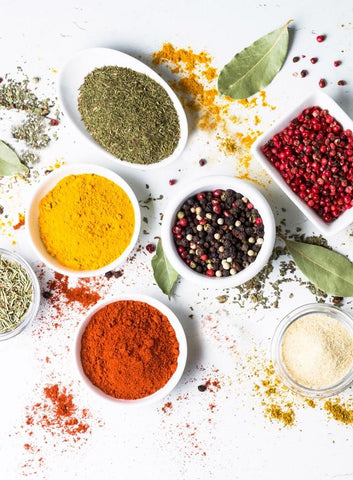
Health Benefits of Ashwagandha
As the most researched adaptogens available in Australia and the world, Ashwagandha has a broad range of health benefits beyond reducing stress and anxiety. Some of the best health benefits of Ashwagandha are:
- Reducing stress, anxiety and feeling overwhelmed
- Promotes mental clarity, brain function and memory.
- Boosts energy and physical performance
- Boosts immunity and supports our immune system
- Improves sexual health
Reduces Stress and Anxiety
Chronic stress is an inevitable part of modern life. Our body is constantly battling to manage physical and psychological stressors in our lives. Daily doses of Ashwagandha extract have been proven to keep the body calm, reduce stress and stabilise your mood. [1] [2]
As an adaptogen, Ashwagandha creates a sense of calm, and reduces your cortisol levels. It does this by lowering cortisol levels and regulating the biological responses involved in inducing stress. [3]
Stimulates Brain Health and Improves Mood
Ashwagandha extract stabilises the neurotransmitter levels in our brains, specifically those responsible for mental wellbeing and cognition. Withanolide A is the active ingredient that is responsible for the growth and development of neurons and involved in the regeneration of the dendritic and axonal cells in the brain. This process improves our memory and brain function. [4] [5]
Boosts Physical Energy and Improves Performance
Ashwagandha is well known to stimulate the body’s function and improve vitality. It does this by increasing the mitochondrial activity of brain fat and muscle. This stimulates energy production, increases oxygen consumption and decreases lipid levels in the blood and liver. Overall, it has been shown to boost energy and increase performance. [6]
Supports The Immune System
Our immune system is the body’s defence against diseases and any foreign bodies. Studies have shown Ashwagandha extract increases the T cell count in the body, which is how the immune system fights disease. In these studies, ashwagandha extract showed faster recovery time and an improved immune response. [7] [8]
Anti-Inflammatory and Antioxidant Properties
Regular consumption of Ashwagandha has been shown to decrease free radicals in the body and protect against inflammatory cytokines and neuroinflammatory proteins in the body. These are harmful to the body and can be the cause of many diseases and disorders. [9] [10]
Improves Sexual Health
Research has proven that this herb is effective in increasing semen quality in males. It reduces apoptosis (cell death) of sperm cells by reducing the concentration of harmful free radicals and increasing the concentration of essential metal ions in seminal fluid. It will also enhance testosterone levels and thus improving the libido in males. [11] [12] [13]
Lowers Blood Sugar and Cholesterol
Our body produces a stress hormone- cortisol in stress. Chronic induction of cortisol increases blood sugar and cholesterol. Aswagandha extract reduces the cortisol level. Research has proven that the regular consumption of ashwagandha for a month lowers blood sugar and cholesterol. [14]
Promotes Healthy Hair and Skin
Ashwagandha contains phytonutrients and antioxidants that are great for skin health. It increases the enzymes that attach damaging free radicals throughout the body.
Ashwagandha extract also improves the metabolism of skin cells, promotes the growth of collagen and helps in the formation of healthy skin. Research using cell lines has shown that Ashwagandha root extract is effective in promoting cell proliferation and decreasing cell deterioration. [15] [16]
Why Does Stress Less Contain Ashwagandha?
I’m sure you can see how amazing Ashwagandha is and why it is included in Stress Less. You can take Ashwagandha by itself, but most health practitioners recommend combining it with other adaptogens to maximise the benefit. This synergistic approach allows for a greater combined effect. That is why Stress Less contains multiple active herbs such as Rhodiola Rosea and Ginseng that all work together to provide a greater overall effect on reducing stress and feeling overwhelmed.

References
- Bhattacharya, S. ., Bhattacharya, A., Sairam, K., & Ghosal, S. (2000). Anxiolytic-antidepressant activity of Withania somnifera glycowithanolides: an experimental study. Phytomedicine (Stuttgart), 7(6), 463–469. https://doi.org/10.1016/S0944-7113(00)80030-6
- Andrade, C., Aswath, A., Chaturvedi, S. K., Srinivasa, M., & Raguram, R. (2000). A double-blind, placebo-controlled evaluation of the anxiolytic efficacy ff an ethanolic extract of withania somnifera. Indian journal of psychiatry, 42(3), 295.
- Shah, N., Kataria, H., Kaul, S. C., Ishii, T., Kaur, G., & Wadhwa, R. (2009). Effect of the alcoholic extract of Ashwagandha leaves and its components on proliferation, migration, and differentiation of glioblastoma cells: combinational approach for enhanced differentiation. Cancer science, 100(9), 1740-1747.
- Kuboyama T, Tohda C, Komatsu K. Neuritic regeneration and synaptic reconstruction induced by withanolide A. Br J Pharmacol 2005; 144: 961–71.
- Kuboyama T, Tohda C, Komatsu K. Withanoside IV and its active metabolite, sominone, attenuate Abeta (25–35)-induced neurodegeneration. Eur J Neurosci 2006; 23: 1417–26.
- Lee, D.-H., Ahn, J., Jang, Y.-J., Seo, H.-D., Ha, T.-Y., Kim, M. J., Huh, Y. H., & Jung, C. H. (2020). Withania somnifera Extract Enhances Energy Expenditure via Improving Mitochondrial Function in Adipose Tissue and Skeletal Muscle. Nutrients, 12(2), 431–. https://doi.org/10.3390/nu12020431
- Mukherjee, D., Ghosal, I., Moniruzzaman, M., De, M., & Chakraborty, S. B. (2019). Dietary Administration of Ethanol and Methanol Extracts of Withania somnifera Root Stimulates Innate Immunity, Physiological Parameters and Growth in Nile Tilapia Oreochromis niloticus. Ribarstvo, 77(3), 107–118. https://doi.org/10.2478/cjf-2019-0012
- Bani, S., Gautam, M., Sheikh, F. A., Khan, B., Satti, N. K., Suri, K. A., Qazi, G. N., & Patwardhan, B. (2006). Selective Th1 up-regulating activity of Withania somnifera aqueous extract in an experimental system using flow cytometry. Journal of Ethnopharmacology, 107(1), 107–115. https://doi.org/10.1016/j.jep.2006.02.016
- Sumantran, V. N., Chandwaskar, R., Joshi, A. K., Boddul, S., Patwardhan, B., Chopra, A., & Wagh, U. V. (2008). The relationship between chondroprotective and antiinflammatory effects of Withania somnifera root and glucosamine sulphate on human osteoarthritic cartilage in vitro. Phytotherapy Research, 22(10), 1342–1348. https://doi.org/10.1002/ptr.2498
- Gupta, M., & Kaur, G. (2016). Aqueous extract from the Withania somnifera leaves as a potential anti-neuroinflammatory agent: a mechanistic study. Journal of Neuroinflammation, 13(1), 193–193. https://doi.org/10.1186/s12974-016-0650-3
- Ahmad, M. K., Mahdi, A. A., Shukla, K. K., Islam, N., Rajender, S., Madhukar, D., Shankhwar, S. N., & Ahmad, S. (2010). Withania somnifera improves semen quality by regulating reproductive hormone levels and oxidative stress in seminal plasma of infertile males. Fertility and Sterility, 94(3), 989–996. https://doi.org/10.1016/j.fertnstert.2009.04.046
- Shukla, K. K., Mahdi, A. A., Mishra, V., Rajender, S., Sankhwar, S. N., Patel, D., & Das, M. (2011). Withania somnifera improves semen quality by combating oxidative stress and cell death and improving essential metal concentrations. Reproductive Biomedicine Online, 22(5), 421–427. https://doi.org/10.1016/j.rbmo.2011.01.010
- Gupta, A., Mahdi, A. A., Shukla, K. K., Ahmad, M. K., Bansal, N., Sankhwar, P., & Sankhwar, S. N. (2013). Efficacy of Withania somnifera on seminal plasma metabolites of infertile males: A proton NMR study at 800MHz. Journal of Ethnopharmacology, 149(1), 208–214. https://doi.org/10.1016/j.jep.2013.06.024
- Andallu, B., Radhika, B., & Suryakantham, V. (2003). Effect of ashwagandha, ginger and mulberry on hyperglycemia and hyperlipidemia. Plant Foods for Human Nutrition, 58(3), 1-7.
- Finney-Brown, T. (2013). Anti-aging effects of Withania Somnifera. Australian Journal of Herbal Medicine, 25(3), 151
- Sanap, A., Chandravanshi, B., Shah, T., Tillu, G., Dhanushkodi, A., Bhonde, R., & Joshi, K. (2017). Herbal pre-conditioning induces proliferation and delays senescence in Wharton’s Jelly Mesenchymal Stem Cells. Biomedicine & Pharmacotherapy, 93, 772–778. https://doi.org/10.1016/j.biopha.2017.06.107
